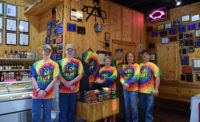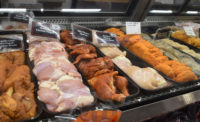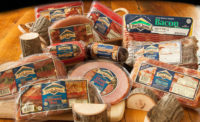Residents of Jerseyville, Ill. have the good fortune of having an award-winning meat processor in town, with a wide variety of flavored brats, chicken kabobs and fresh meat. So do the residents of Alton, Ill. and Edwardsville, Ill. There’s no need for those residents to compare one meat market against the others, since it’s all the same company. Starting from its Jerseyville home, Hansen Meats has spent the last decade growing and expanding its retail presence adding two additional locations in Southern Illinois.
For much of its existence — which dates back to 1951 — Hansen Meats was better known as Hansen Packing Meats, processing livestock for area farmers. Its business evolved through succeeding generations, but establishing a retail presence has been a relatively new development for the company. Spurred on by the third-generation owners, Ryan Hansen and his sister Beth Arrowsmith as president and vice president, respectively, the company has rebranded itself as Hansen Meat Co. and has focused on becoming a household name for Southern Illinois residents.
“We never had a focus on retail at all until probably the late ‘90s or early 2000s, when we started to wrap some products and put them in a two-door freezer,” Ryan Hansen says about the company’s entry into the retail world.
Hansen graduated from Saint Louis University in 2003 with a degree in business management from the John Cook School of Business. When he came into the business, the company was primarily a wholesaler and processor for local farmers. The company is still active in those markets, but Hansen believed that the company’s future lay in another direction.
“I figured that if we could get our reputable name out to more people by selling retail products, we might have a fighting chance and have some fun doing it by coming out with new flavors and new products,” he explains.
The company’s retail space, as well as its product range, has expanded ever since. An expansion at its Jerseyville home in 2013 gave it a proper retail market for the first time, as well as an expanded processing area to accommodate it. A new Hansen Meats market opened in Alton in 2015, and the newest location in Edwardsville made its debut in summer of 2017.
A tradition of innovation
Hansen Meats’ latest store is a far cry from the company’s two-door freezer. A spacious marketplace holds plenty of coolers for Hansen Meats’ lines of brats, hams, bacon, meat snacks and other necessities. The store is the only one of the three to have a liquor license, so a selection of wines is available to pair with a nice steak or chicken dinner. Everything that carries the blue Hansen Meat label is produced by the company in its Jerseyville location, but the cutting room in Edwardsville was made large enough to handle most production tasks as well.
“If we add a packaging line here, we can pretty much do anything that we can do up in Jerseyville on a smaller scale,” Hansen says. “We wanted to be able to have that growth, so as we got busier and customer acquisition got better and better, we didn’t have to feel like we were already outgrowing the space and have to go look for somewhere else.”
Hansen Meats’ growth into the retail market is typical of the company’s progression. Ever since the company was founded in 1951 by Bill “Good Buddy” Hansen and his wife, Sissie, each succeeding generation has added a new dimension to the business. Family legend has it that he approached his father-in-law about the idea of starting a packing plant, and the father-in-law responded with, “Don’t quit your day job.” Good Buddy Hansen quit his job the next day and started the company. He serviced the farmers that needed cows or hogs processed. He also found a niche by processing 50 to 100 cattle per week and selling the sides of beef to nearby Scott Air Force Base.
Later, as markets changed, second-generation owner David Hansen built up a prosperous wholesale business. He took on the side of the business that the large distributors couldn’t replicate at the time.
“We were taking cases of product and breaking them down into smaller quantities, so the mom & pop shops didn’t have to buy pallets of product,” Hansen says.
Eventually that market changed as well, as the large-scale distributors began to adopt the Hansen model of selling smaller quantities of products to the smaller customers.
“I noticed what was happening, and really for the survival of our business, I thought that if we continued to go down that path, there are only so many mom and pops out there that have their loyalty to us,” Hansen explains. “Whenever that generation decides to sell off their business, is the next owner going to have that same loyalty to use us only as a vendor?”
As Hansen Meats has grown as a retailer, its product line has increased. Hansen notes that when he first got involved with the business in high school, the retail product line was limited to hamburger patties, a couple of brats and one flavor of chicken kabob. A plant expansion, the addition of a few key pieces of equipment and employees with a love of product development have helped grow the product line considerably. The company’s regular pork brat has won the Grand Champion Award at the Illinois Association of Meat Processors Product Show, and its flavored brats include everything from a Sriracha to a Philly & Mozzarella Brat. Bacon-wrapped seasoned chicken breasts and ground pork patties are also popular among its clientele.
The Jerseyville location’s processing plant is approximately 10,000 square feet in size. All total, the company employs a total 25 to 30 people, factoring in seasonal employees, in all of its locations.
“The sky is the limit now; we can take all these great ideas that we have, and we have the processing facility in Jerseyville to get that product out, in a large quantity,” Hansen notes.
While the majority of the products in the retail stores are made in Jerseyville, a few are made by a co-packer in Illinois. Hansen Meats acquired H&B Ham Co., a nearby smoked meats company, in 2014. H&B Ham is a very popular area product that dates back to the early 1970s. It is distributed to about 50 stores in the region, and the growth of that brand is a goal for the coming year.
“That’s definitely a focal point of mine in 2018,” Hansen says of the H&B brand. “Having gotten used to the brand and having a strategic partner doing the manufacturing for me with our recipe out of a federal plant, I can then key in on scaling sales and try to pour some gas on that brand.”
Hansen also developed a separate meat business, FireCreek Jerky, after experimenting with small batches of product in Jerseyville. Hansen and his partners in this project have been working to grow interest in the snack sticks and jerky, which are also made by the Illinois co-packer that is producing the H&B Ham products.
Hansen calls the effort of taking shelf space away from the major meat snack players a monster challenge, “but it’s been a fun one, showing people what we have that’s different from all the other jerky and snack sticks that are out there and seeing people’s reaction once they try the product.”
The Edwardsville market is about 35 miles southeast of the company’s Jerseyville home, and Alton is about 20 miles to the west. The growth potential at the new location is so strong because of all the fast-growing towns around it. Hansen points out that Edwardsville itself is growing, and neighboring cities like O’Fallon and Granite City, Ill. are doing just as well.
“We’ve noticed some of our customers are getting younger and younger, and for a while there it was older and older. We’re starting to see that 25-to-40 year-old customer that we weren’t seeing when we first started our retail shops,” he adds.
The independent meat market with the knowledgeable staff and unique products is trending at the moment, but Hansen doesn’t believe that buying local is just a trend or a buzzword.
It’s also been a movement that a lot of people have adopted and have taken a big interest in,” he says, “putting their dollars into small businesses trying to make it and providing better and more unique products that [consumers are] not able to find at the big grocery stores.”
Hansen and his sister are both part of the Gen-X demographic, and he’s seen that movement in action among his own friends.
“Even though we’re in our mid-30s and should be going a million miles an hour, it’s still important for us to know where good food an actually come from. I think these small-time butcher shops and other specialty stores are a big part of that, because you get to really know the owners and see their passion in the products they’re making for their customers,” he says.












Report Abusive Comment